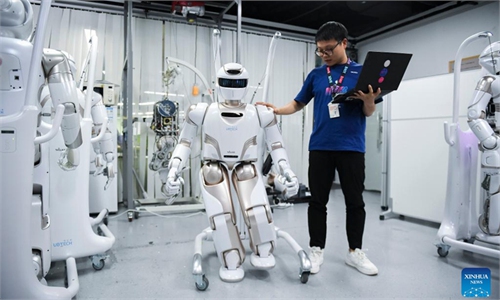
Illustration: Tang Tengfei/GT
China is ramping up efforts to improve and complete legislation and regulations for the rapidly expanding artificial intelligence (AI) technology sector and related industries. The work report of the Supreme People's Court of China noted that it will properly adjudicate cases involving AI and support the lawful application and regulated development of AI, the Xinhua News Agency reported on Saturday.In addition, the work report of the Standing Committee of the National People's Congress noted that China will strengthen legislative research in emerging fields such as AI, the digital economy and big data in 2025, according to Xinhua.
The statements issued by China's legislative and judicial departments sent clear signals. They indicate that the legal framework governing AI will be enhanced, establishing a stronger legal foundation and guarantee for technological innovation and application.
The AI sector, which exemplifies the rise of key strategic emerging industries in China's economic transition toward high-quality development, has achieved rapid development in recent years. With the widespread application of AI technology, related legal disputes have been increasing, raising new requirements for judicial practice, such as issues concerning copyright ownership of AI-generated content, data privacy protection and algorithmic bias.
An increasing number of cases involving AI are appearing in the field of judicial rulings, presenting unprecedented challenges to judicial adjudication, the People's Court Daily said in a report published in May 2024. Searching the keyword "AI" on the China Judgments Online database, starting from 2018, which is known as the first year of AI industrialization, a total of 3,307 judgments related to AI were found, according to the report.
From the global perspective of the technological and industry development of the AI sector, the widespread application of AI requires a legal framework to regulate the new issues emerging with the technology. Mentions of AI in legislative proceedings across the globe have nearly doubled, rising from 1,247 in 2022 to 2,175 in 2023, The 2024 AI Index Report by the Stanford Institute for Human-Centered Artificial Intelligence showed.
The legal governance of AI in China began with the State Council's issuance of the Development Plan for the New-Generation Artificial Intelligence in 2017. This plan set the ambitious goal of establishing a comprehensive legal, regulatory, ethical and policy framework for AI by 2030.
China's legal system has rapidly improved in areas such as cybersecurity and the digital economy to meet the new demands of technological and industrial development. In response to the evolving AI technological landscape, China's legal system is rapidly addressing the new challenges posed by technological and industrial advancements.
For instance, the issue of the copyright eligibility and ownership of generative AI works has become a central concern for the AI industry, the Legal Daily reported on Sunday, citing the case of China's first copyright case involving AI-generated images and text last year.
China's accelerated efforts to establish a comprehensive legislative framework for AI align with global industry trends. As China's AI technology and industry evolve, they face significant opportunities alongside external competitive pressures. Strengthening legal and regulatory support will be crucial in fostering the healthy development of China's AI industry.
The country's ongoing commitment to this endeavor not only underscores its support for AI technology advancement but also highlights the determination of judicial authorities to regulate the application of emerging technologies while safeguarding the rights and interests of individuals and enterprises.
China's proactive approach to enhancing its legal framework for AI balances the need to foster innovation with the necessity of tackling emerging challenges. These strategic moves not only ensure sustainable growth in this vital sector but also position China as a significant player in the global AI governance.
The author is a reporter with the Global Times. bizopinion@globaltimes.com.cn



